The Art of Living permaculture
The Art of Living permaculture is a unique concept of permanent agriculture restoring the techniques of farming for a sustainable planet.
Why Permaculture?
In 2018, an eminent lawyer in India lost his father to cancer. His father was a vegetarian, a teetotaller and yet he fell prey to the deadly cancer. Even after a so-called sattvic lifestyle what went wrong? The doctors shared that even the vegetarian food that we eat today is no less dangerous because it is grown using pesticides and chemicals. He stumbled upon a course in permaculture and this changed his life. He bought a 7 acre farmland and now works to make it a model farm. He grows his own chemical free food and inspires all around him to do the same.
In simple words, permaculture is the new way of life and sooner we adopt it we can contribute to nurturing the quality of our soil, water, air and as a result safeguard our health and reverse climate change. The easy part is that one does not need acres of farmland to grow their own food; a small terrace, balcony or even the kitchen window pane is enough to make a start.
A journey from rocks to crops
In 2013, I stood upon a tall rock and looked around and as far as I could see, all that I saw was 7 acres of rocks, stone, and a landscape devoid of any vegetation or life form. The rocky land was severely degraded due to overgrazing, erosion, and soil leaching.
My task – to transform this piece of rocky land into a flourishing lush green farm.
Impossible? Well, at least that’s what I thought to myself. But when we trust Nature to do its job, the fruits are always bountiful.
For months, me and my team of three people spent a lot of time understanding the interdependencies of nature’s five elements; air, fire, water, earth, and space and how our environment responds to these naturally. We observed, experimented, failed many times, observed again and slowly designed systems that went with the flow of nature rather than going against it.
We were determined to develop a landscape that was soil rich, fertile, pest free, with healthy groundwater reserves, and most importantly gave us nutritious and chemical-free produce. Our determination and focus led us to adopt and adapt to a new culture – Permaculture!
Through consistent application of permaculture design principles and mimicking natural systems, this 7 acre land is today home to a variety of flora and fauna and has transformed itself into a copious and biodiverse food forest.
But why am I sharing this story with you? And more importantly why are you reading this story? Well, you and I are here because we care for mother earth, or we want to make our own kitchen garden, or we want our kids to learn about gardening, or simply because we want to pursue a hobby.
Whatever the reason maybe let me tell you it is time we humans started to pay attention to our food and how we treat mother earth.
My vision is to develop an army, yes an army of Permaculturists who can revolutionize the way we grow food. And I welcome you to join this army! What does not matter here is gender, religion, caste, age, occupation, region, or country… all that matters is that you care for what you eat.
So come, one and all, let’s learn to grow food for health and tend to mother earth sustainably.
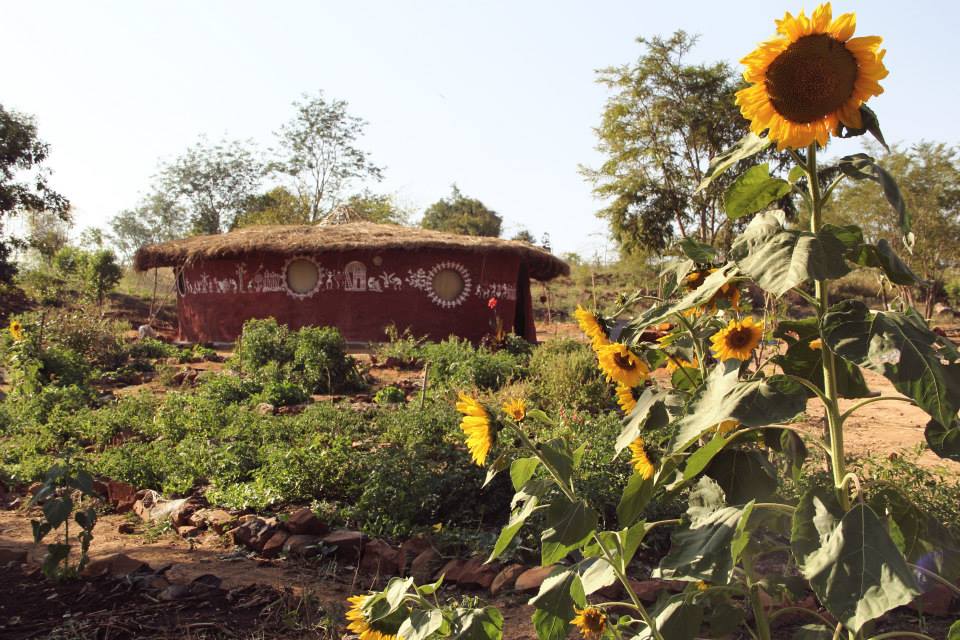
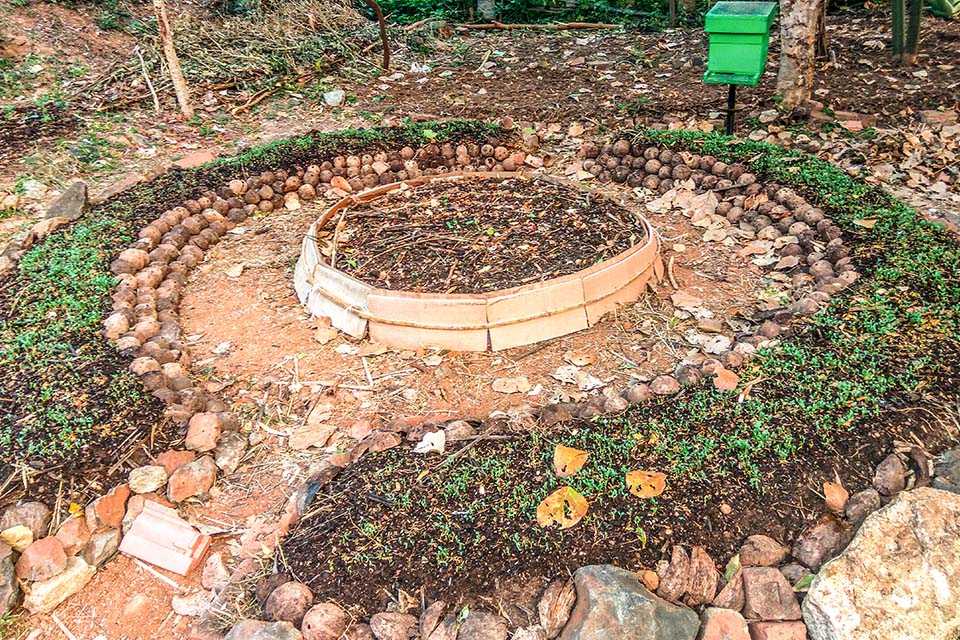
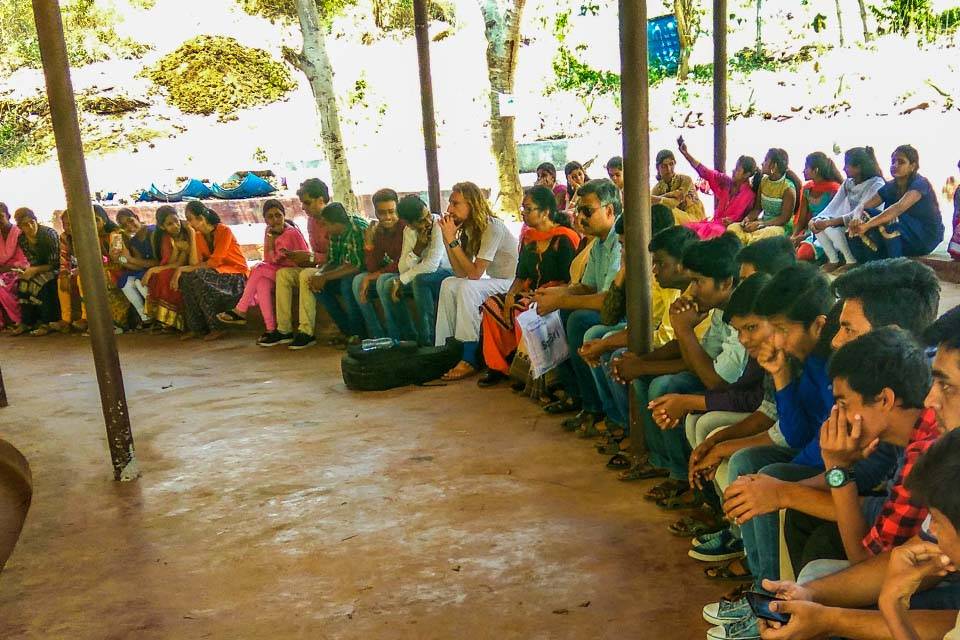


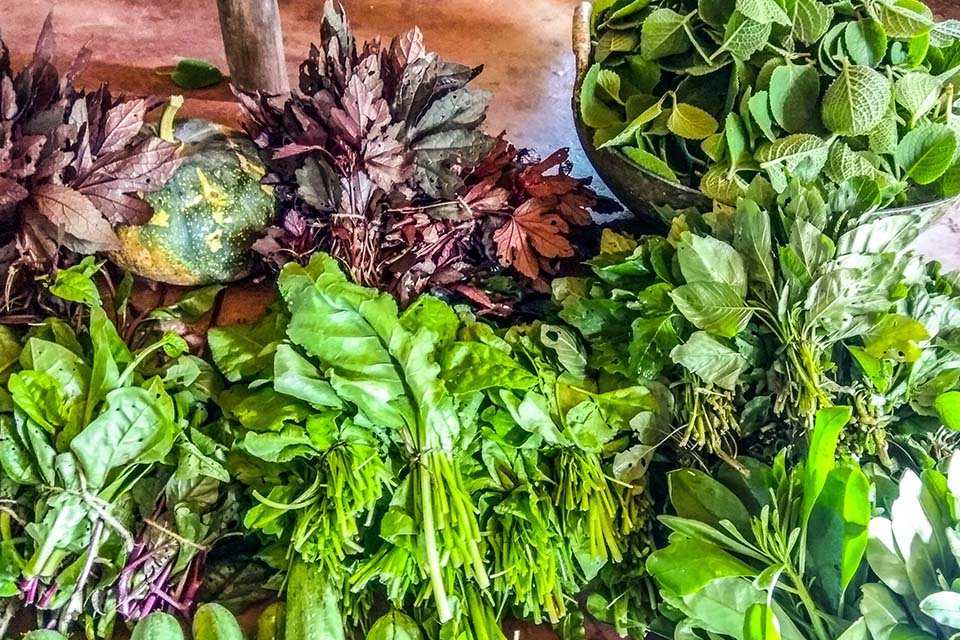


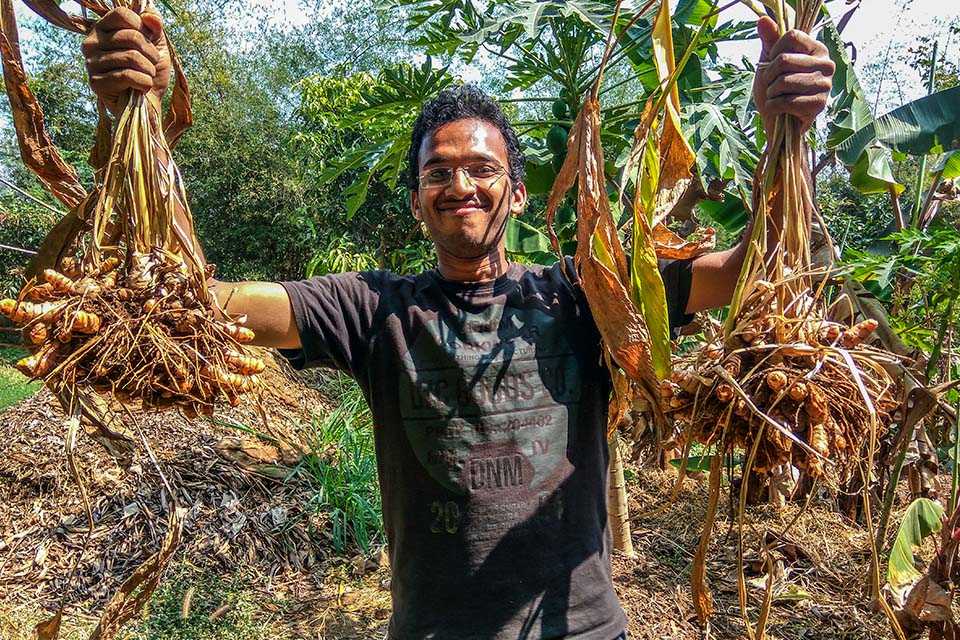


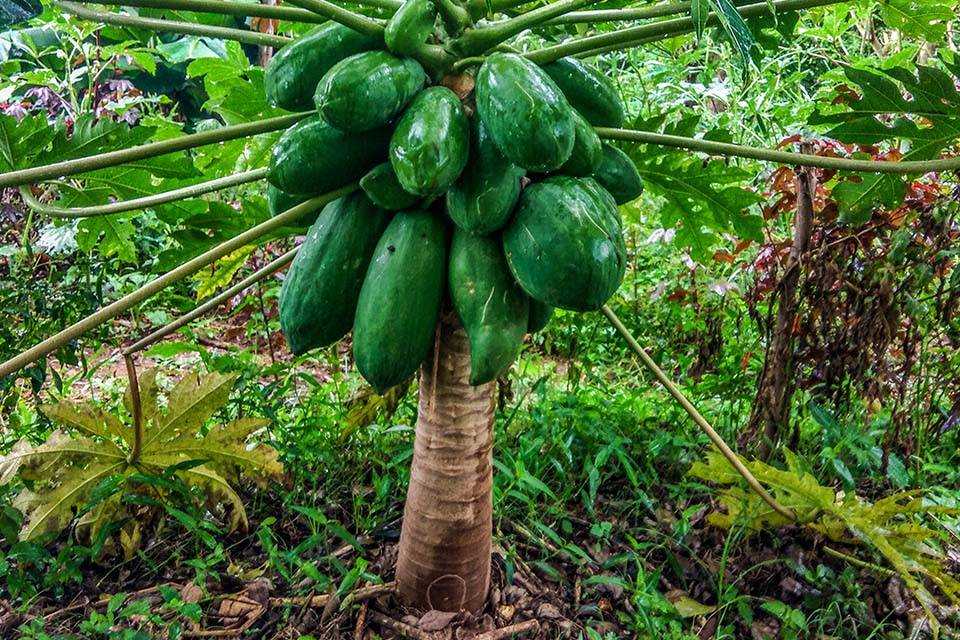

















Introduction to The Art of Living Permaculture Farm
Gurudev Sri Sri Ravi Shankar, one of the greatest humanitarians in the world today, decided to convert a part of the Art of Living International Ashram in Bangalore, into a lush green farm, to set an example. What separated this farm from other farms was the challenge that lay in transforming this mountainous land sans top soil, into a living jungle with abundant food supply. Gurudev wanted to show the world that it is possible to grow food on the most infertile terrain, if only we respected the laws of Nature.
In 2013, with the blessings of Guruji work commenced. Swales were dug on slopes for water harvesting, garden beds were raised, fruit trees were grown. A bamboo and mud hut was also built to provide some shade and comfort. This was all in accordance with the principles of permaculture. In a short timespan of just 90 days the results were visible. The beds were full of plants, the fruits trees had started to root and grow well. Water harvesting was in progress. Through consistent application of permaculture design principles and mimicking natural systems, this 7 acre land has given birth to a variety of flora and fauna and has transformed itself into a copious food forest full of verdure in just a few years.
Today, the Art of Living International Ashram Permaculture farm houses a conglomerate of plant species and birds and is an abundant source of fruits and vegetables. We hope to transform many such landscapes and educate people about the advantages of permaculture design as a strategy for land remediation and home grown food. Being in sync with Nature, walking the Permaculture path is the only way to care for ourselves and our planet sustainably.
Programs we offer


Home Grown, Home Cooked: For Beginners
Home Grown Home Cooked, initiates the new enthusiastic grower to Permaculture and sets him/her on the track of growing food sustainably without harming Nature. It encourages beginners to observe and understand how soil, soil organisms, water, air, cattle and organic matter work harmoniously to create a rich topsoil and a robust eco-system for our food to grow without any use of chemicals.
Home Grown Home Cooked, is the stepping stone to Permaculture, is a 7.5 hours program which spans over 3 days. The syllabus includes the basic but the most essential elements of Permaculture that can be practiced in your balcony, rooftop, garden, farm or any available space.
- Permaculture and its basics
- AWE (Air, Water & Earth) factor
- Sustainability, Ecology & Agriculture
- Composting
- Importance of Cattle
- Seed sowing & plantation
- Making grow bags/pots
- Virtual farm tour
- Home work for hands on
- Question-answer session
It is a 7 and a half hours program which spans over 3 days.
Since the past few years, the amount of fertile land on this planet has more than halved. It is rapidly losing topsoil to deforestation and industrial chemical agriculture. Depleting soil, water and air quality has led our climate to change and our food to be adulterated. Look around, our entire existence flourishes thanks to the 5 elements of Nature namely; air, water, earth, fire and space. Agriculture, one of the oldest cultures in the world, was always in sync with Nature. Nature, in turn, blessed us with abundant food and kept us healthy. It was a non-complex and natural barter system between man and Nature. For so long as Man respected this exchange, Nature nourished us, keeping our environment protected and Man disease-free.
The good news is, we can still turn the tables; if we make better choices. Industrial Agriculture has a massive carbon footprint today and is a major cause of disease, soil erosion, droughts, floods and famines. Going back to growing our food without any dependency on chemicals is the need of the hour. So we can breathe life into our soil again and grow healthy food.
Today, we can bring this lost wisdom of farming with Nature back into our lives through Permaculture. Permaculture, which is an art of replicating natural systems, can help us grow nutrient-dense food anywhere; our balcony, terrace, garden, farm or any space we have available.
Permaculture for Kids
Permaculture for kids initiates kids early on to take on growing their own food; which helps them develop respect towards the art of growing food, the grower and food itself. When they are involved in the process of growing their own food, it helps them understand how deeply we are connected to the natural world.
- Guided farm tour
- Games wherein kids will run around the farm to recognize maximum number of plants and seeds and flowers
- Pottery
- Plantation/seed sowing
Experience sharing
By observing Nature closely and working with it, kids learn that if we care for Nature, Nature will care for us. Sowing seeds, nurturing plants, helping them grow and harvesting food inculcates the priceless values of patience, gratitude and responsibility which can go a long way in molding a child’s personality. It makes understanding certain ecological concepts learnt in school easier to understand through application. Moreover, it improves overall physical and mental fitness.
The Permaculture farm at the Art of Living International Ashram invites kids from all age groups to come and experience the magic of growing food so they can go home and recreate this magic in their own balcony, terrace or garden and lead future generations by example.
They say, if you ask your kids to do something, they may not listen. But if they see you doing it yourself, they will end up mimicking you. That’s how kids learn; through observation and immersion.
It is important for upcoming generations to learn right from a very early age that a healthy environment is synonymous with nutritious food, clean air and abundant water, a healthy world is built on the principles of Nature and that a country’s richness is first measured by its heritage, biodiversity, culture and greenery.


Our Other Programs
- Permaculture for Corporates (CSR)
- Permaculture & Beyond: (Advanced Permaculture Program)
Upcoming Programs
Interested to participate in the Permaculture Programs?
Fill up this form for us to get back to you
Facilities and Amenities at Our Center
- 24/7 Shuttle Service
- ATM's
- Travel Desk
- Internet & WiFi
- Shopping Complex
- Cafe and Restaurants
Facilities and Amenities
- 24/7 Shuttle Service
- ATM's
- Travel Desk
- Internet & WiFi
- Shopping Complex
- Cafe and Restaurants
Must watch
Other Programs
For Beginners
Powerful breathing techniques, deep meditations, life skill tools and practical wisdom which are easy to apply in daily life to be sustainably happy.
For Children & Teens
Meticulously designed programs for kids and teens to bring out the highest potential in every child of this generation.
Advanced Programs
Bundle of advance programs which enhances inner peace and outer dynamism by deep-diving within and experiencing the true version of self.




